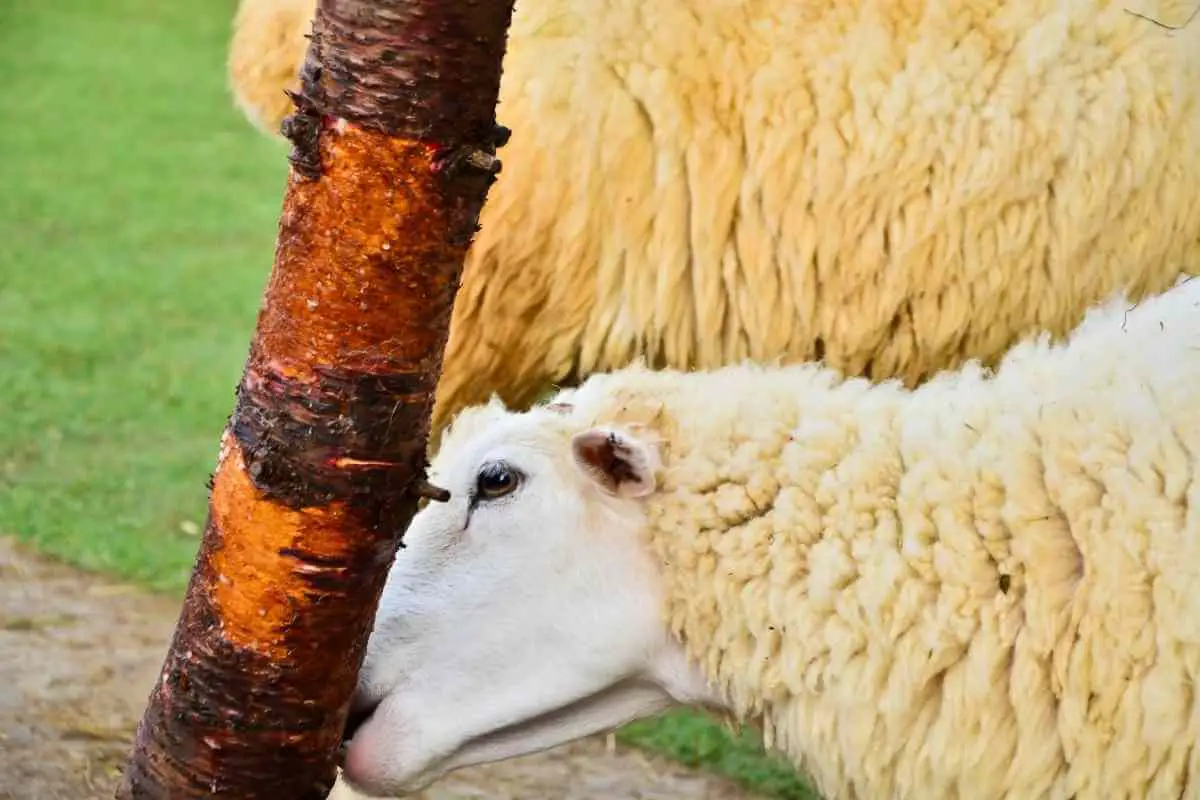Sheep plus fruit trees equals damaged fruit trees, especially if fruit trees are young. Backyard or homestead sheep will eat the tender bark of a young fruit tree, girdling and killing it.
If you are using a small grazing flock as your lawnmower, don’t underestimate their capacity to browse your fruit tree bark and branches.
Just a few sheep can easily overwhelm an orchard with dwarf trees.
If you are a smallholder or homesteader looking to keep sheep and a thriving orchard, some ground rules and creative thinking are definitely going to be necessary.
In This Article: We will explain the type of damage sheep can do by eating fruit trees and provide suggestions for effective strategies for protecting your fruit trees from sheep-inflicted damage.
In Your Mind, Sheep and Lambs Grazing Amongst Laden Fruit Trees Is a Bucolic Scenario
In reality – it’s a nightmare!
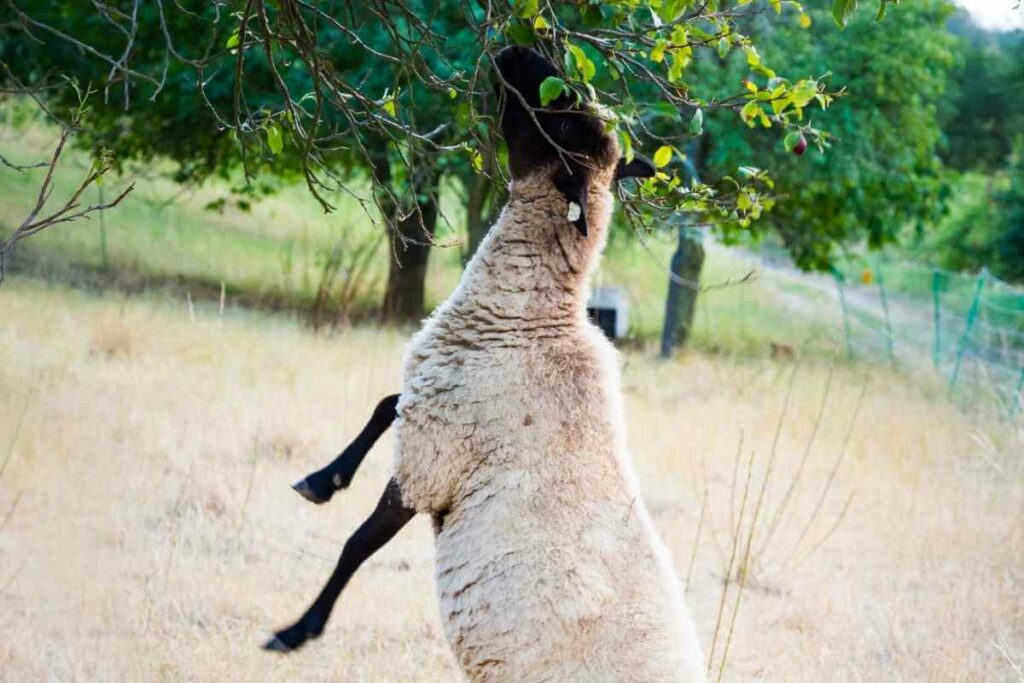
Keeping animals and fruit trees together is the source of constant challenges, but many war-weary growers have managed to get fruit trees to maturity while keeping sheep at bay.
Here is what you need to know.
For Fruit Tree Health, Grass in the Orchard Needs to Be Kept Under Control
Active orchard-floor management is an essential part of caring for fruit trees and achieving their maximum yield of fruit.
Grass and weeds compete with fruit trees for sunlight, water, and nutrients.
Grasses are especially competitive and take more from fruit trees than brambles or broadleaved weeds.
Even adding fertilizer to the soil does not counteract the negative effects of overgrown grass which include:
- Delayed fruiting
- Reduced fruit yield
- Reduced trunk diameter
- Reduced shoot length
So, there is definitely a need to keep the growth of all vegetation around fruit trees down as much as possible.
Traditionally this was done by either manually cutting the hay by scything or mowing or using livestock to graze the grass, saving on the manual labor.
This is certainly where the idea of keeping backyard sheep and other animals around fruit trees comes from.
Sheep Have a Remarkable Propensity to Damage Fruit Trees
If you introduce sheep into an orchard with unprotected fruit trees, they are likely to eat them.
They are always browsier than livestock owners expect.
Unfortunately, sheep do not remain grazing on grass, but quickly turn their attentions to fruit trees and damage them in a variety of ways:
- Sheep will eat tender young fruit tree bark causing damage known as girdling or ringbarking. This condition is where a fruit tree has near-complete or complete loss of bark around its lower trunk, causing complete disruption of the flow of sap through the tree. If the sheep damages small or superficial areas of bark, the fruit tree may recover, but damage to the phloem and cambium leads to die-back and death of the tree.
- Sheep and lambs also target lower leaves, shoots, and accessible branches of the tree.
- Lower branches can become broken.
- Shrubby trees and fruiting bushes can be completely destroyed in hours.
- Sheep are partial to using older trees as scratching posts. The continual rubbing against the bark and pressure against the trunk can stunt the tree.
Your fruit crop is not safe either, as sheep will eat fruit they can access from off the tree and any fallen fruits in your orchard.
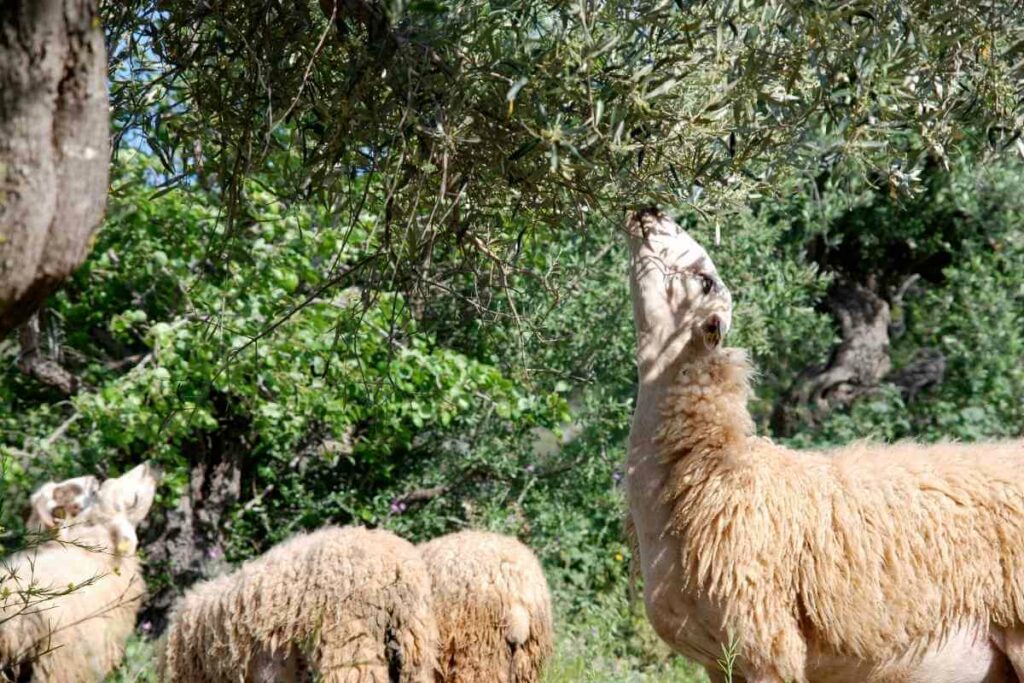
Having sheep around your fruit trees has other effects too:
- Many grazed orchards have too many animals in them for their size, leading them to become overgrazed.
- An excess of animal waste puts extra nitrogen into the soil which can alter the ecological balance in the orchard. The growth of weeds like nettles, thistles and dock will predominate and suppress valuable wildflowers that are vital to attract those all-important pollinators.
- Dung near the tree base can also alter the microorganisms and chemical composition of the soil and deteriorate the health of a growing tree.
Sheep Aren’t the Only Livestock That Target Your Fruit Trees. Other Animals Are Capable Too!
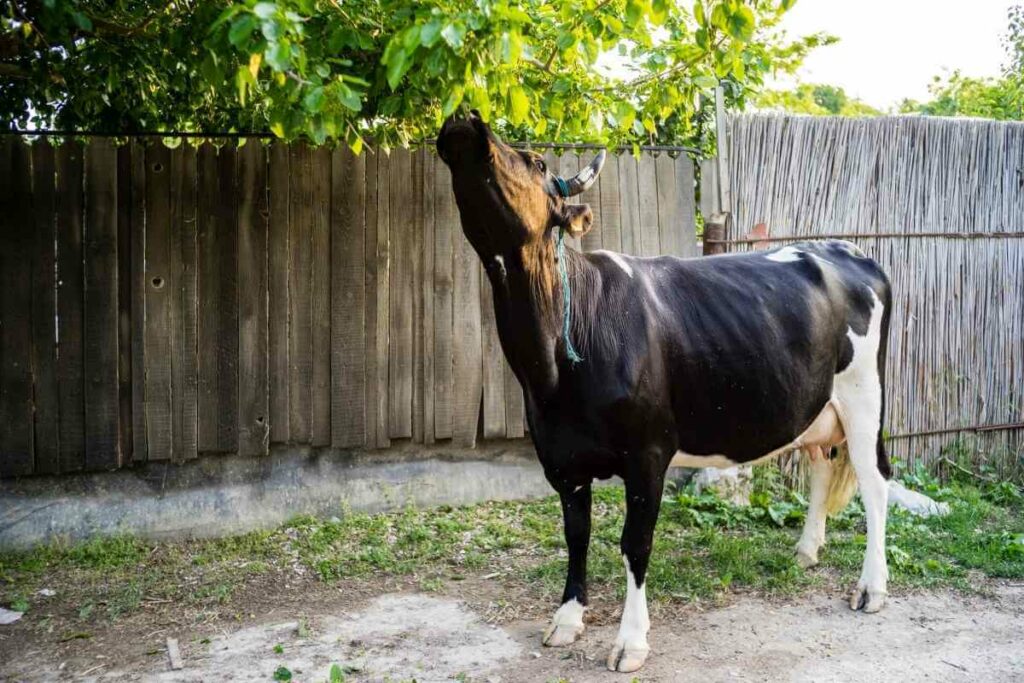
Just about any farm animal will want to tuck into your fruit trees, but these particular animals also have a reputation for eating and damaging fruit trees:
- Goats: Goats are very destructive in orchards and can easily overcome barriers and other protections you use for your fruit trees. They will actively climb and strip down younger trees, killing them.
- Cows: Cows absolutely love fruit tree leaves and will defoliate fruit trees quickly. They are simply too destructive for an orchard.
- Pigs: Though pigs can roam wild in forests with mature, well-established trees, they will be too much for an orchard. The damage by pigs in an orchard is primarily physical, with pigs rooting up young trees and chewing on them.
- Horses: Horse owners exercise caution with fruit trees as some are toxic to horses. Horses can also physically damage and nibble fruit trees.
- Deer: Deer browsing is voracious and almost always fatal. If your orchard is in an area where deer are present you will need to strengthen your fencing to prevent them from gaining access.
How to Stop Backyard Sheep Eating Fruit Trees!
Despite the risk to the trees, many landowners and farmers will still let orchards be grazed by livestock as an ecological method of managing vegetation growth.
To do this without damaging plants and trees, smallholders can install a range of livestock guards to provide a physical barrier for fruit trees.
Livestock Guards to Prevent Your Backyard Sheep from Eating the Fruit Trees
The size and design of livestock guards for fruit trees vary widely according to the type of tree or shrub it surrounds and the accessibility of the lowest limbs.
They usually have to be adjusted as the tree grows.
These protective structures can be self-built, purchased or assembled or installed by a contractor.
The posts of the livestock guard need to be well-sunk or sheep that want to have a good scratch will easily knock them over.
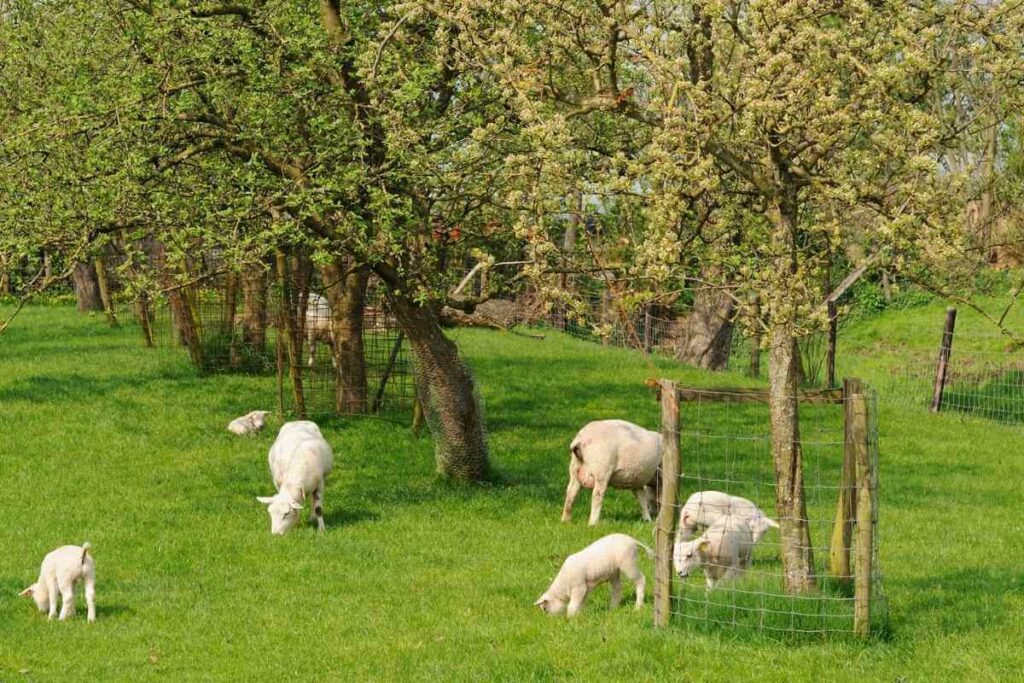
Their sturdiness will depend on the animal that you are guarding against, with higher and heavier guards used for horses and cows.
Options for fruit tree guard design:
- Two short posts with flexible mesh: Sheep can be kept at bay by driving two short posts on either side of the tree with a sturdy, but flexible plastic mesh wrapped around. The posts can support the tree, but owners should keep vegetation growing inside the mesh barrier down.
- Plastic tube and post: A plastic tube is another guard commonly used to protect young trees. However, sheep have pushed the tubes down and uprooted trees.
- Chicken wire: Chicken wire is cost effective and can be wrapped around the trunks of mature fruit trees to stop it becoming damaged by grazing or rubbing.
- Weld mesh: Weld mesh is another cheap option for protecting fruit trees, but if it is not properly staked, it can shift position and wound the tree. Some landowners place a rubber top around the weld mesh to better protect the tree.
- Three to four posts with timber top bars: This is a sturdy and long-lasting option that creates a robust boundary around the fruit tree.
- Welded railings: This custom-built welded metal guard completely encloses a young fruit tree and is resilient against impacts from sheep and other cattle. They have to be removed once the tree reaches a certain size.
There are Some Effective Non-physical Options That Can Protect Fruit Trees from Sheep Too
Here are some alternatives to livestock barriers that may prove effective in getting your fruit trees some relief:
- Garlic: garlic that is sprayed or rubbed on the tree trunk may deter sheep and other livestock.
- Salt licks: mineral licks have been shown to be an effective diversion from a vulnerable fruit tree.
- Manure and water: a solution of manure and water applied to the fruit tree truck may put animals off from approaching.
Rounding up
If your backyard sheep continue to cause trouble to your growing fruit trees, you might remove them from the area altogether.
You may not be aware, but there are animals that are beneficial for your orchard.
You could introduce any of the following animals to do essential weeding and improve the overall health of your orchard:
Weeder geese, backyard hens, and ducks will not only graze your orchard but also gobble up pests and uproot weeds. Their droppings also help to add nourishment to the orchard soil.
After all your effort in protecting your fruit trees, you do not want to lose the fruits to overhead visitors.
Remember to net soft fruit trees to prevent birds from feasting on the fruits.
